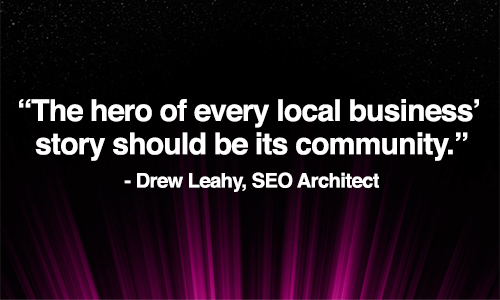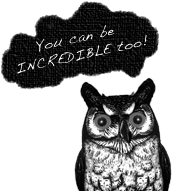
Whether you realize it or not, your business tells a story. It’s telling one right now.
All businesses tell stories. Not tales, or lies, but real stories.
Stories tell your audience who you are, what you stand for, why your offer and the way you offer it deserves attention, and how your product or service will make us feel.
Stories are the reason why some people drive a Mercedes over a Honda Civic, even though the Civic costs less, gets better gas mileage, and will take you farther for longer.
A personal trainer is telling a story about how healthy living and nutrition and fitness will make you look and feel better.
So how does your local business’ story need to differ from a national, or global, business like Mercedes?
It’s all in how you tell your story.
And it needs to start with your community and end with your community.
This article is about how your local business can tell a story that resonates.
Is your local business telling the wrong stories to the wrong people?
Here’s a story:
A 12-year-old boy from a Podunk town in Northwest Illinois brings his Go-Kart to the big leagues: Daytona International Speedway, NASCAR.
If you were a betting guy or gal, and I asked you to place a wager on the boy’s performance—Go-Kart vs. Stock Car—whose side would you wager on?
We would never expect a 12-year-old boy and his Go-Kart to outwit, outmuscle, outlast or out-anything Jimmy Johnson, a 6-time NASCAR Champion with a multi-million dollar fuel-injected stock car, especially in Jimmy’s own backyard: Daytona International Speedway.
Now what if I told you Jimmy Johnson brought his stock car to the back alleys of Northwest Illinois for an inner-city showdown against that same 12-year-old boy and his Go-Kart?
All the power, size and speed of Jimmy’s multi-million dollar fuel-injected stock car are no longer advantageous in the back alleys and slippery tight corners of the boy’s Podunk town—the one he’s raced in his entire life.
Why?
Because the boy’s Go-Kart works better when it’s local.
He built it for tight corners, maneuvering, and short bursts of speed, not the 500-mile-long Daytona International Speedway.
The Go-Kart actually performs better on a small course. And because the boy knows his hometown like a fish knows water, he plays to his strengths, not his opponents.
Your local business’ story should also play to your strengths—your location.
So why do we often expect our local business to outwit, outmuscle, or outperform our national competition with the same story even though we possess different strengths?
Because we think mass-market before we think micro-market.
We’re telling the story the wrong way.
As intergalactic marketer Seth Godin says,
“The winning strategy for the local business or freelancer, then, is:
1. Provide a product or service that truly works better when it’s local, and
2. Do it in a way that works better when it’s small, custom, connected and not in search of economies of scale.”
Like our 12-year-old’s Go-Kart, your local business will do better against an economy of scale (in the boy’s case, Jimmy Johnson) when you build it to be “small, custom and connected,” too.
Why Your Story Doesn’t Work
A local personal trainer in Post Falls, Idaho won’t reach a fly on the wall with his story if he loads his blog with generic fitness tips and healthy-living “How-To’s.
His business tells the story that if you eat healthy and stay fit with personal training and exercise, you will look and feel better. So why wouldn’t fitness tips and How-To’s work?
Because he’s telling it wrong.
Fitness Magazine and Food Network already own that story, not to mention hundreds of other fitness and health niche bloggers and brands like Men’s Fitness and Women’s Health Magazine, or even Nutrition.gov that offer myriad nutritional information for children. The list goes on, but the truth never wavers: economies of scale already own that story.
If you’re a local business with national competitors, chances are they’ve owned their story long before you considered creating yours.
Owning your story means you also own the assets that come with it: social, search, and content.
Your story will flounder if you tell it the same way as your national competition.
Your national competitors already own equity in that particular iteration of the story in the form of search, social and content.
How to Tell A Story For Your Local Business That Does Work
If you shape your local business’ story around being better in the micro-market (your community) rather than the macro, and do it in a way that actually helps your business work better when it’s small and connected, your message will eventually own assets in search, social and content (assets that reach your community by the way).
If our personal trainer from Post Falls, Idaho follows this advice, it doesn’t mean he needs to ditch his aspirational story of helping others achieve a better life through fitness and nutrition tips.
Our 12-year-old boy with his Go-Kart didn’t decide he should race horses instead of a motor vehicle, just because Jimmy Johnson’s car was faster on the track.
Instead, he built his Go-Kart to perform better in his locale, and brought the race to him. He told his story a different way.
If our personal trainer builds his story around performing better when small and local, he will add value to the people living in his own community. And that blog he was working on will undergo a transformation:
– 10 Quick and Easy Weight Loss Tips turns into 10 Hikes in Post Falls That Will Make You Sweat
– How to Eat Healthier turns into 6 Certified Organic Grocery Stores in Post Falls
– Interview w/ Celebrity Fitness Trainer turns into Interview w/ University of Idaho School of Kinesiology Dean
“National Fitness Month” will turn into a 31-day healthy food drive in his community. His charitable donations to Global Sports Foundation will turn into scholarships for local high school students who commit to losing weight.
You get the point.
He’s telling his story (healthy living and exercise with personalized fitness and training will make you look and feel better) so that it works better for his audience: his community.
Conclusion
Every business has a story, whether you know it or not. And every story has a hero. The hero of every local business’ story should be its community.
1. Think hyper-local and stay there. Everywhere else is already taken.
2. Remember the story of the Go-Kart vs. the Stock Car when it comes to building your story: Build it to be better in the local. Your location is the one advantage you hold over your national competitors, and the beauty is that will never change.
3. They call it a “local” business for a reason.
4. Stop hiding behind the anonymity of the mass-market because it feels like less of a risk, and own your unique story.
Telling your story the same way someone else is telling it won’t work. “You can’t out Amazon, Amazon.”
What are some ways you’ve built your local business to work better in the small, micro-market? Share in the comments . . .
Incredible Marketing is a full-service internet marketing firm specializing in SEO and Social Media, Mobile Websites, and Custom Web Design. You can be Incredible too! Call us at 800-949-0133 or visit our website!

